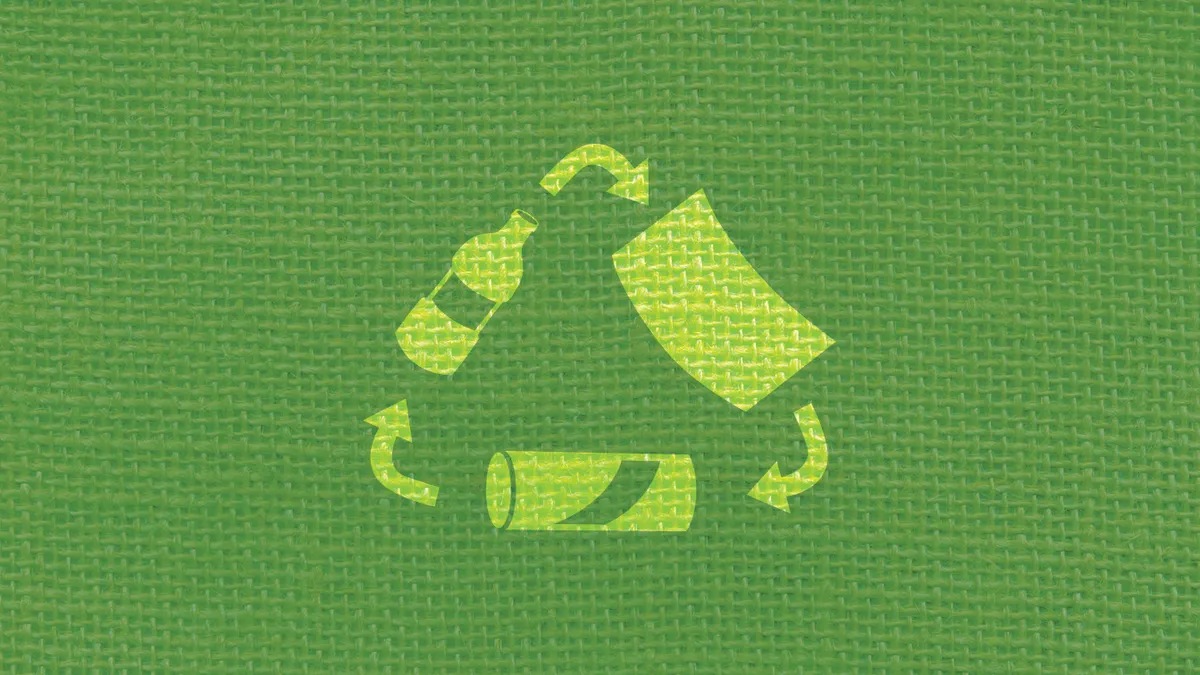Dive Brief:
- California Gov. Gavin Newsom signed AB 815, legislation that amends a portion of the Public Resources Code related to solid waste management to encourage — but doesn't mandate — that municipalities switch from single-stream to dual-stream recycling programs.
- The legislation requires California's Department of Resources Recycling and Recovery (CalRecycle) to examine whether cities, states and regional authorities have implemented source-separated recycling programs, meaning fiber is separated from containers and glass. However, the document clearly states that the intention is not for CalRecycle to take punitive measures against municipalities that do not transition to dual stream.
- The law, which aims to reduce contamination through greater source separation in curbside recycling programs to improve material marketability, will take effect January 1, 2020.
Dive Insight:
Prior to its amendment with the dual-stream language, California law required each city, county or regional agency to send an annual report to CalRecycle about its waste reduction efforts. The agency was ordered to check that each jurisdiction developed source reduction, recycling and hazardous waste plans to divert 50% of all solid waste from landfill. CalRecycle then was expected to check each jurisdiction's compliance every two to four years and had the authority to enforce the law, such as by issuing a compliance order containing recommended actions.
State Assemblymember Cecilia Aguiar-Curry introduced the bill to reduce the amount of contamination in single-stream curbside programs, which are the norm throughout the state. Contamination has gained increased attention in the past couple of years, as it is a primary reason the Chinese government cites for refusing to accept foreign countries' recyclable materials. Aguiar-Curry notes in a statement that reducing contamination could make the materials collected curbside more marketable both domestically and abroad. The goal is also to reduce the amount of recyclable material being stockpiled or disposed recently.
“When we throw all of our recyclables into the same bin, glass breaks, leftover soda spills on copy paper, and many recycled materials become too dirty to be reused ... AB 815 will keep our recyclables cleaner and more marketable so they can actually be turned into new products,” Aguiar-Curry said in the statement.
Communities across the country have taken action over the past two years to save recycling programs and reduce contamination of materials collected from consumers. Some communities are eliminating troublesome items such as glass or difficult-to-recycle plastics and getting back to recycling "core" materials: PET, HDPE, cardboard, aluminum and steel. For example, a bill was introduced in Washington earlier this year that would eliminate glass from recycling programs statewide.
Lake Worth, Florida, was among the first U.S. communities to announce a transition back to dual stream curbside recycling. Brookhaven, New York, soon followed. Other examples have been reported in Missouri and New Jersey. Aguiar-Curry cited California's own Mill Valley Refuse Service, which conducted a dual-stream recycling pilot program, as another example.
Some view AB 815 as a good start toward cleaning up curbside recycling streams, but recognize single-stream remains a more favorable option for many in the industry.
"[T]he loss of the Chinese and other markets for mixed recyclables is making many realize that if we truly want our discards to be recycled, we need to work harder at properly separating them and making sure everything is clean and dry and free of contamination," California Resource Recovery Association (CRRA) Interim Executive Director Tracie Onstad Bills told Waste Dive via email. "California’s Assembly Bill 815, by encouraging a move to dual-stream recycling, is a step in the right direction.”
However, CRRA did not formally sign on to support AB 815. Onstad Bills notes that despite the law's good intentions, it likely will not have a real impact. The sentiment appears to be shared by other recycling advocates and associations who often publicly support recycling legislation but did not do so for this measure.
According to an August committee analysis, key supporters for the bill included glass industry representatives and Mill Valley. Multiple waste and recycling companies opposed it – including Waste Management and Republic Services – along with various industry associations.
While California is known nationwide for leading recycling changes, the economic, logistical and messaging hurdles involved often with a potential dual-stream conversion may be too much for some local jurisdictions to manage. Unless a change is required by law this bill may end up being more symbolic than practical.















